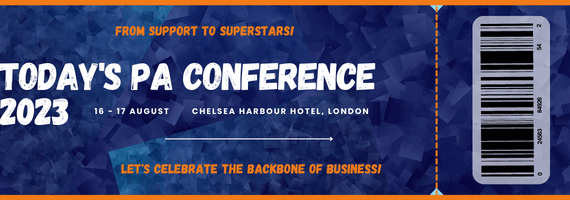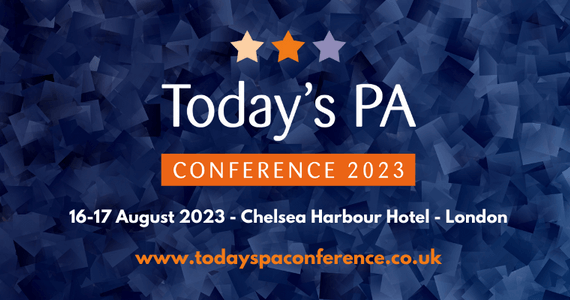Shopping cart
Your cart is empty
£0.00

Today’s PA launched their inaugural £10,000 PA award in March 2016. It’s an ambitious award – not only is the £10,000 prize the biggest of its kind in the UK, the selection process will include a ‘bootcamp’ day, testing PAs on their skills and general knowledge. The Award Ceremony and Gala Dinner will take place in the spectacular Grand Connaught Rooms in London’s Covent Garden on 4th November 2016.
Whilst organising the event, we spoke to several award-winning PAs and asked them to complete a short questionnaire. We wanted to know more about the impact their award has had on their careers so far.
The PA respondents came from all over the world (UK, Ireland, Italy, South Africa, New Zealand), and competitions were at both a regional and national level. Sponsors and prizes differed but there were many similarities in the reactions of their managers and peers, and how the PAs themselves built upon their success.
Of the 13 PAs who responded to our questionnaire, most had won either one or two awards, and had been runner-up or finalists in several others.
The awards were both regional (Manchester PA of the Year, London PA) and National awards, with the number of categories (Rising Star, Social Media PA, Networking PA, Network Ambassador, Best Organised Event) reflecting the diversity and range of skills and talents of today’s PAs.
Most PAs were already aware of the competition before they entered, or had heard about it from friends, the media or the PA community. Some were nominated, or persuaded to enter, or were even entered for the award unknowingly by their managers or colleagues. Others entered themselves for the award for a variety of reasons: to raise the profile of PAs working in their particular sector, because it was the first award of its kind in the country, or as a personal goal.
Rosie Camm (Executive Assistant, Manchester Camerata Chamber Orchestra) was nominated for the award by her Chief Executive, based on her first 100 days working for the organisation.
Sherri Eckworth (Senior Executive Assistant, TMW Unlimited), was nominated by the organisation’s HR department without knowing. The first she heard of it was when the team behind the award contacted her to say she’d been shortlisted!
Both regional and national awards had some high-profile sponsors, such as newspapers, recruitment companies, conference & exhibition organisers, PA magazines, and networking groups. The array of prizes ranged from a luxury short break to a gourmet hamper, and from fine dining to a cocktail masterclass. For some of the national awards the prizes included an all-expenses-paid holiday for two in Cape Town; another prize included a host of ‘goodies’ (training course vouchers, Bobbi Brown make-up, jewellery, styling session) as well as a stay in a penthouse apartment. All award-winners received a trophy and flowers.
However, for all of the PAs, whichever award they entered, by far the most important accolades were the recognition and prestige, as well as being acknowledged as an ambassador for their profession.
All the respondents were already highly experienced PAs when they won their award. Most had around 10 – 15 years’ experience, with a few having between 20 and 30 years. Only one PA had (just) less than 10 years’ experience at the time of winning.
The number of roles (or roles with the same PA duties but with different titles) held during their career was mostly between four and six. Whereas some had changed employers regularly in order to move up the career ladder, others working in larger organisations had opportunities to progress whilst staying with the same company.
Debbie Grimshaw (Executive Assist to MD, Brother UK Ltd) has held six PA roles, four of these being with her current employer, and Daniela Fasano (PA to CEO of BOSCH Italia), with 18 years’ experience, has held three PA roles in that time, all with the same organisation.
For several awards, PAs initially completed a questionnaire or other form of written application. Awards such as Office* PA Contributor of the Year, We Are The City awards, and the London PA awards were then either solely or partly decided by the number of votes received. For other awards, the application form (or nomination) was followed up with interviews by the judging panel (consisting of three or four people), with the interview being the final part of the selection process.
In other awards, the process was more involved. Rebeka Adamson (PA, Enable, New Zealand) from New Zealand who won the AAPNZ Administrative Professional Award 2015, also had to undergo a technical training test in MS Office, a psychometric test and a two-part assessment (a five minute speech and interview with the judging panel).
Sue France (Sue France Training) who was nominated for the European SMART PA award by her boss, also had to sit an exam and then give a five minute presentation to the judges and sponsors.
There were concerns that some awards did not have clear-cut scoring systems. Jacqui Quigley (Senior Administrative, Assistant, LinkedIn) felt that the selection processes for some of the awards could also be more transparent.
Sue France highlighted the fact that on one particular award there was no proper scoring system for the judges, resulting in PAs being compared unfairly.
Another PA found that, though the initial part of the process had been excellent, the final interview stage was a disappointment and the time for candidates was far too brief to establish a rapport with the judges. In fact, she had the distinct impression that the panel had already made up their minds.
This experience contrasted sharply with another award she entered a few weeks later. For this particular award, the overall communication was poor (candidates not knowing what stage they were at in the selection process, or even how many stages there were). However, the interview with the judging panel was incredibly positive, with the panel asking ‘open’ questions and the candidates being given the time to go into greater detail about their careers.
Every respondent was deservedly proud of being honoured, speaking of the recognition received, the huge confidence boost and how it had raised their own profile as well as that of the PA profession.
All PAs felt that the award had given them the confidence to move out of their comfort zone, going on to achieve much more than they’d imagined. They also felt that doors had opened for them, with opportunities not previously considered: mentoring other PAs and speaking at events. Connecting with other PAs has also led to many becoming active networkers and more involved in professional PA organisations such as EUMA.
Nomvula Moloko, (Moloko Speakers and Associates) who won the South African National Office Professional of the Year 2012/13, felt it helped her to see that she had a career, rather than a job, and start to think of it as a strategic professional role, a business partnership with her executive. She admitted she was initially worried she might not live up to being an ambassador for the profession, and being a shy person she saw public speaking as a huge challenge. Having joined Toastmasters to improve her presentation and speaking skills, she has now gone on to establish her own successful mentoring and coaching business.
Sherri Eckworth, who was nominated by the HR department, felt more tied to her employer because of this, resulting in her feeling much more part of the team.
Another PA pointed out that since the award, others had started to look to her for advice and mentoring, and asking for contributions to various initiatives. Whilst this was a fantastic side-effect of winning, she found she needed to employ some effective time management techniques in order to respond to all these requests – and keep up with her day-to-day work.
Rebeka Adamson felt that since winning the award she had become much harder on herself and feels a fraud if she makes any small errors. (Her answer: to remind herself that she’s human!)
Nearly all managers and employers were thrilled and proud. They saw it as recognition for adding value to their own work and the reputation of the business. PAs were delighted with the moral and practical support they received, and many bosses actively encouraged their PAs to take up the opportunities that arose.
Despite this, some PAs reported that the company as a whole did not celebrate or acknowledge the award.
Awards such as “Networking PA” or “Social Media PA” were perceived by some bosses and employers as ‘personal awards’ that would only benefit the PA themselves, rather than reflecting well on the organisation.
One PA said that, although her awards were celebrated by her employer, her bosses did not consider her achievements relevant when it came time for her annual appraisal.
Another PA found she encountered slight negative reactions and jealousy from some PA groups.
Most PAs, however, said that they were overwhelmed by the support of their peers and felt that the PA community is incredibly loyal to each other, and more than happy to celebrate one another’s successes.
From the respondents’ comments, it appears that, on the whole, bosses and employers are extremely proud and delighted for their PAs, able to see the value in having an award-winner as an ambassador for their company and the community.
Despite the wide-ranging impact that winning had on the PAs, not all are continuing to enter awards (although some think they may again at some point). Others are now participating in awards on a different level as one of the judging panel.
Those still entering awards (or considering it) are looking at Rising Star, Social Media PA, Female Entrepreneur, Women in Business, or Mentor of the Year.
With all of our respondents, there was a feeling that even with the awards raising the profile of PAs, there is still much work to be done. Debbie Grimshaw hit the nail on the head, highlighting that it had taken 30 years for PAs and EAs to be recognised and for their value to be rewarded.
The overwhelming feeling from these award-winning PAs is one of pride. All are passionate about their work and thrilled that the growth of awards is “spreading the word” about their profession. They all agreed that they would actively encourage others to enter an award of any kind – for the prestige, the confidence-boost, the new opportunities that open up, and the chance to use the recognition and momentum of winning as a springboard to other things.
Our PAs’responses highlighted one or two concerns in the awards process – ones that, from the outset, we wanted to eliminate completely.
The main concerns in this area were: too brief a time in the interviews, feeling that judges had already made up their minds, and PAs not always asked the same questions.
As the Today’s PA Award is the largest of its kind in the UK, we knew we had to ensure that all of our entrants were judged fairly and equally, with a clear judging process set out well in advance.
With this in mind, we developed our ‘bootcamp’ day to test all shortlisted PAs on a range of topics including general knowledge, team work, crisis management and Microsoft skills. This will create a ‘level playing field’, making sure that everyone is asked the exact same questions and is marked on a clearly defined criteria.
Our PA respondents also told us that the current range and extent of awards offered a showcase for the skills and talents within the PA community and helped to promote being a PA as a career in its own right. With £10,000 prize money, we’re confident that the 10KPA award will attract the top PAs and EA in the country and continue to raise the profile of a wonderful and varied profession.
To apply for the Today’s PA Awards please visit www.10kPA.co.uk. Closing dates for all eight awards is 31st July 2016.
… amongst others, who were kind enough to give their time and respond to our questionnaire.
PAul Pennant
MD & Principal Trainer at www.todaysPA.co.uk



Tel.: +44 (0)20 7622 2400
Email: info@todayspa.co.uk
Today's PA
52 The Warwick Building
Chelsea Bridge Wharf
366 Queenstown Road
London
SW11 8NJ
Copyright © 2024 Today's PA. All rights Reserved.
We use cookies, just to track visits to our website, we store no personal details.
ACCEPT COOKIES What are cookies?